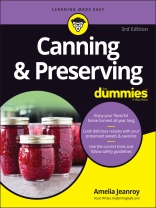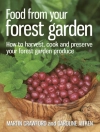Get your food preservation skills in the can
Craving a juicy peach in the barren midwinter? Yearning for a cupful of home-grown tomato soup before the seeds are even in the ground? Canning makes you the ultimate boss of your food supply all year ’round and helps you reduce costs and maintain quality control over what you eat—and to be prepared in times of food shortages. And Canning & Preserving For Dummies shows you how to do it all, helping you explore hundreds-of-years-old traditions of food preservation in the comfort of your own home.
In a friendly and step-by-step style, longtime canner and owner of The Farming Wife.com Amy Jeanroy takes you inside the canning world to show how modern technology and techniques have made it easy to use the four main methods of preservation—water-bath and pressure canning, freezing, and dehydrating—to keep your pantry packed with delicious, out-of-season delights. She also clues you in on how to match preservation technique to food for the most flavorful results—and what supplies to keep on hand for your next canning adventure.
- Know the benefits, from healthier eating to self-reliance
- Follow the latest food safety guidelines
- Get guidance on food storage in urban living
- Cook up tasty recipes with your preserved delights
Whatever draws you to canning—saving money on groceries, healthy living, or the sheer fun of doing it—this book is stuffed with all the goodness you need to keep your palate happy whatever the season is!
Table des matières
Introduction 1
About This Book 1
Foolish Assumptions 3
Icons Used in This Book 3
Beyond the Book 4
Where to Go from Here 4
Part 1: Getting Started 5
Chapter 1: A Quick Overview of Canning and Preserving 7
Appreciating the Benefits of Canning and Preserving Your Own Food 8
Introducing Your Techniques: Canning, Freezing, and Dehydrating 9
About canning food 10
About freezing food 12
About dehydrating food 13
Holding the Keys to Canning and Preserving Success 13
Chapter 2: Gathering Your Canning and Preserving Gear 15
Keeping Basic Kitchen Tools at the Ready 15
Essential tools and utensils 16
Important pots, pans, mixing bowls, and more 20
Specialty equipment to make work easier 20
Add as needed: Handy but nonessential items 22
Canning Equipment 23
Canning vessels 23
Must-have canning tools 23
Required Tools and Equipment for Freezing Food 29
Necessary Tools and Equipment for Dehydrating Food 30
Chapter 3: On Your Mark, Get Set, Whoa! The Road to Safe Canning and Preserving 31
Dispelling Your Fears of Home-Canned and Home-Preserved Food 32
Preparing your food properly 32
Packing your jars with care 33
Choosing the right canning method and following proper procedures 35
Checking your equipment 36
Knowing the Acidity Level of Your Food 37
Adjusting for Your Altitude 37
Spoiler Alert: Identifying Food Spoilage 38
Meeting the spoilers 38
Determining what you need to dispose of 40
Part 2: Water-Bath Canning 43
Chapter 4: Come On In, the Water’s Fine! Water-Bath Canning 45
Water-Bath Canning in a Nutshell 46
Foods you can safely water-bath can 46
Key equipment for water-bath canning 47
The Road to Your Finished Product 49
Step 1: Getting your equipment ready 49
Step 2: Readying your food 51
Step 3: Filling your jars 51
Step 4: Processing your filled jars 52
Step 5: Removing your filled jars and testing the seals 53
Step 6: Storing your canned food 54
Adjusting Your Processing Times at High Altitudes 55
Chapter 5: Simply Fruit (Yes, a Tomato Is a Fruit) 57
Picking and Preparing Your Fresh Fruit 58
Identifying the proper degree of ripeness 58
Cutting and peeling: Necessary or not? 59
Deterring discoloration 59
Raw pack and hot pack 59
Lining your jars with liquid 60
Fresh Fruit Canning Guidelines 62
Chapter 6: Sweet Spreads: Jams, Jellies, Marmalades, and More 83
Introducing Your Sweet Spreads 84
Choosing Fruit for Sweet Spreads 85
Getting Up to Speed with Fruit Pectin 85
Commercial pectin basics 85
Types of commercial fruit pectin 86
Setting Up without Adding Pectin 87
Water-Bath Canning: The Key to Sweet Spread Canning Success 89
Chapter 7: Condiments and Accompaniments: Chutney, Relish, Sauce, and Syrup 99
Expanding Your World of Condiments and Accompaniments 100
Enjoying the surprising flavors of chutney 100
Reveling in your relish 100
Satisfying your salsa needs 101
Savoring syrup with a berry base 101
Chapter 8: The Art of Pickling 109
Bring on the Brine 109
Gathering the ingredients 110
Following the appropriate brining process 111
Keeping that crunch 113
A Few More Prep Tips to Ensure Tasty Pickled Treats 114
Picking Pickling Equipment and Utensils 115
Part 3: Pressure Canning 129
Chapter 9: Don’t Blow Your Top: Pressure Canning 131
Understanding the Fuss about Low-Acid Foods 132
Choosing Your Pressure Canner 132
Cover: With a gasket or without 134
Gauges 136
Vent tube, pipe vent, or petcock 138
Overpressure plug (or safety valve) 138
Rack 138
A-Canning You Will Go: Instructions for Successful Pressure Canning 139
Step 1: Gearing up 139
Step 2: Preparing your food 141
Step 3: Filling your jars 141
Step 4: Placing the jars in the canner 142
Step 5: Closing and locking the canner 142
Step 6: Processing your filled jars 143
Step 7: Releasing the pressure after processing 143
Step 8: Removing and cooling the jars 144
Step 9: Testing the seal and storing your bounty 144
Disposing of Spoiled Products 145
If your jar is still sealed 145
If your jar has a broken seal 146
Pressure Canning at Higher Altitudes 146
Chapter 10: Preserving Your Vegetable Harvest 149
Selecting Your Vegetables 150
Picking the perfect produce 150
Vegetables not recommended for pressure canning 150
Prepping Your Veggies for Pressure Canning 151
Cleaning your vegetables 151
Raw packing versus hot packing 152
Processing Tips for Successful Results 154
Under Pressure! Canning Vegetables 154
Using Canned Vegetables 158
Chapter 11: Don’t Forget the Meats! 187
Preparing for Pressure Canning Meats 187
Tips for safety and efficiency 188
Selecting and preparing the meat 189
Meat canning, step by step 190
Canning Meat Cut into Cubes or Strips 191
Preparing the meat 191
Filling the jars 192
Canning Ground Meat 192
Pick Your Packing: Canning Poultry 193
Canning fresh poultry: Cold packing 193
Canning previously frozen chicken: Hot packing 193
Worth the Effort: Canning Fish 194
Picking your fish 195
Preparing fish and seafood 195
Filling the jar 195
Including Meats in Other Canned Mixes 196
Chapter 12: Combining the Harvest: Soups, Sauces, and Sides with Beans 207
Confidently Canning Food Combos 208
Choosing the appropriate processing method 208
Tips for a successful meal 209
Getting your meal on the table 210
Stocking Up on Soup 210
Teaming Up with Tomatoes 211
Rounding Out Your Meals with Beans 211
Part 4: Freezing 225
Chapter 13: Baby, It’s Cold Inside! Freezing Fresh Food 227
Defining Freezing 227
Meeting the Spoilers of Frozen Foods 228
Bacteria, molds, and yeast 228
Enzymes 229
Freezer burn and oxidation 229
Ice crystals 230
Gearing Up to Fill Your Freezer 230
Knowing what should (and shouldn’t) be frozen 230
Evaluating your freezer 231
Packaging Your Food and Filling Your Freezer 232
It’s a wrap! Choosing a container 232
Tracking your frozen food trail 235
Packing your freezer 236
Thawing Out Your Frozen Food 236
Choices for thawing 237
Unplanned thawing 237
To refreeze or not to refreeze thawed food 238
Chapter 14: Meals and Snacks in a Snap: Freezing Prepared Foods 239
The Whys and Wherefores of Putting Up Prepared Food 239
Considering the benefits 240
Removing the guesswork with meal planning 240
Keeping the keys to quality in mind 241
Freeze Convenience Meals Now, Thank Yourself Later 242
Main dish casseroles 242
Soups, stews, sauces, and stocks 242
Save Some Dough: Freezing Breads, Cakes, and Other Treats 243
Bread, buns, muffins, and rolls 243
Cakes 244
Cookies 244
Pies 245
Freezing Dairy Products and Nuts 246
Making the Most of a Good Meat Deal: Freezing Meat, Poultry, and Fish 247
Packing hints 247
Thawing tips 247
Chapter 15: Freezing Fruits, Vegetables, and Herbs 249
Mastering the Easy Art of Freezing Fruit 250
The fruit freezing process at a glance 250
Selecting mighty fine fruit 250
Preparing your fruit for freezing 251
Selecting a storage container 252
Considering syrup concentrations 252
Keeping headspace in mind 253
Thawing and using frozen fruits 253
Freezing Vegetables Like a Pro 253
Simple instructions for freezing vegetables 254
Taking a closer look at the blanching process 254
Packing your vegetables 255
Thawing and using your vegetables 256
Freezing Fresh Herbs 256
Properly prepping your herbs for freezing 256
Adding creative flare to your frozen herbs 257
Part 5: Dehydrating and Storing 283
Chapter 16: Light and Nutritious: Dehydrating Food 285
Setting Up for Food Drying Success 286
Understanding key food drying factors 286
Assembling the necessary equipment 287
Putting suggested drying strategies in play 287
Choosing a Drying Method 288
Quick and consistent: Investing in an electric dehydrator 288
Getting results with a conventional oven 290
Setting your trays in the sun 291
Storage Solutions: Protecting the Life of Your Dried Food 293
Chapter 17: Dehydrating a Variety of Delicious Fresh Fruit 295
Putting Your Best Fruit Forward 296
Understanding what impacts the dehydrating process 296
Making time for pretreating 296
Navigating Your Fruit-Drying Experience 298
Drying fruit step by step 298
Evaluating dryness 299
Rehydrating and Enjoying the Labors of Your Drying 300
Chapter 18: Dehydrating Vegetables for Snacks and Storage 319
Vegetable Drying at a Glance 320
Following some basic rules 320
Storing and using your dried produce 321
Signs of trouble: Good food gone bad 321
Drying Common Vegetables 322
Mixing It Up for Soups, Stews, and More 325
Chapter 19: Drying Herbs 353
Selecting, Drying, and Storing Common and Not-So-Common Herbs 353
Chamomile 356
Dill 357
Marjoram 357
Mint 358
Oregano 359
Rosemary 360
Sage 360
Stevia 361
Tarragon 361
Thyme 362
Getting Creative with Herb Cooking: Rubs and Blends 363
Herbs for Teas 363
Chapter 20: Helping Your Food Keep Its Cool: Cold Storage Spaces 371
Cold Storage Must-Haves 372
Exploring Your Cold Storage Options 373
Tried and true: The traditional root cellar 373
DIY storage spaces 374
Following Simple Cold Storage Rules 378
Preparing Foods for Cold Storage 379
Apples 379
Beets 380
Cabbage 380
Carrots 381
Garlic 381
Onions 382
Pears 382
Potatoes 382
Tomatoes 383
Turnips 383
Part 6: The Part of Tens 385
Chapter 21: Ten (Plus) Troubleshooting Tips for Your Home-Canned Creations 387
Jars That Don’t Seal Properly 388
Jars That Lose Liquid During Processing 388
Jars with Cloudy Liquid 389
Dark Spots on Your Jar’s Lid 389
Jelly with the Wrong Consistency 389
Cloudy Jelly or Jelly with Bubbles 390
Moldy Jelly 390
Jelly with Very Little Fruit Flavor 391
Glasslike Particles in Your Jelly 391
Hollow, Shriveled, Discolored, or Slippery Pickles 391
White Sediment at the Bottom of the Pickle Jar 392
Food That Floats in the Jar 392
Food with an Off Color 393
Chapter 22: Ten Common Food Storage Problems and How to Solve Them 395
I never use up all my stored food, and so it goes to waste 396
I don’t know how much to preserve 396
My family doesn’t want to eat the food 396
I don’t have any more room and I am not done 397
I don’t know what I have already stored 397
I don’t know which preservation technique to choose 397
I don’t know how to use the food I have preserved 398
My preserved food looks weird 398
I used up all the food that I stored 398
I don’t know where I’ll store food if I start preserving it 399
Appendix: Metric Conversion Guide 401
Index 405
A propos de l’auteur
Amelia Jeanroy is passionate about packing her pantry with tasty foods from her small farm and using them to create delicious, healthy meals. She is the blogger behind thefarmingwife.com and the author of a weekly newsletter full of recipes for using and storing summer garden produce. Amy has been canning and preserving foods for more than 20 years.












